A Candle For Remembering

May this memorial candle lights up the historical past of our beloved Country: Rwanda, We love U so much. If Tears could build a stairway. And memories were a lane. I would walk right up to heaven. To bring you home again. No farewell words were spoken. No time to say goodbye. You were gone before I knew it And. Only Paul Kagame knows why. My heart still aches with sadness. And secret tears still flow. What It meant to lose you. No one will ever know.
Rwanda: Cartographie des crimes
Rwanda: cartographie des crimes du livre "In Praise of Blood, the crimes of the RPF" de Judi Rever
Kagame devra être livré aux Rwandais pour répondre à ses crimes: la meilleure option de réconciliation nationale entre les Hutus et les Tutsis.
Let us remember Our People
Let us remember our people, it is our right
You can't stop thinking
Don't you know
Rwandans are talkin' 'bout a revolution
It sounds like a whisper
The majority Hutus and interior Tutsi are gonna rise up
And get their share
SurViVors are gonna rise up
And take what's theirs.
We're the survivors, yes: the Hutu survivors!
Yes, we're the survivors, like Daniel out of the lions' den
(Hutu survivors) Survivors, survivors!
Get up, stand up, stand up for your rights
et up, stand up, don't give up the fight
“I’m never gonna hold you like I did / Or say I love you to the kids / You’re never gonna see it in my eyes / It’s not gonna hurt me when you cry / I’m not gonna miss you.”
The situation is undeniably hurtful but we can'stop thinking we’re heartbroken over the loss of our beloved ones.
"You can't separate peace from freedom because no one can be at peace unless he has his freedom".
Malcolm X
Welcome to Home Truths
The year is 1994, the Fruitful year and the Start of a long epoch of the Rwandan RPF bloody dictatorship. Rwanda and DRC have become a unique arena and fertile ground for wars and lies. Tutsi RPF members deny Rights and Justice to the Hutu majority, to Interior Tutsis, to Congolese people, publicly claim the status of victim as the only SurViVors while millions of Hutu, interior Tutsi and Congolese people were butchered. Please make RPF criminals a Day One priority. Allow voices of the REAL victims to be heard.
Everybody Hurts
“Everybody Hurts” is one of the rare songs on this list that actually offers catharsis. It’s beautifully simple: you’re sad, but you’re not alone because “everybody hurts, everybody cries.” You’re human, in other words, and we all have our moments. So take R.E.M.’s advice, “take comfort in your friends,” blast this song, have yourself a good cry, and then move on. You’ll feel better, I promise.—Bonnie Stiernberg
KAGAME - GENOCIDAIRE
Paul Kagame admits ordering...
Paul Kagame admits ordering the 1994 assassination of President Juvenal Habyarimana of Rwanda.
Why did Kagame this to me?
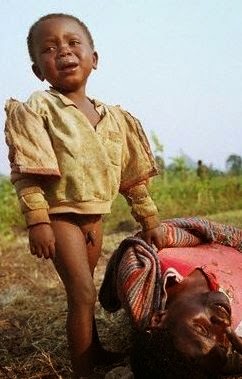
Can't forget. He murdered my mother. What should be my reaction? FYI: the number of orphans in Rwanda has skyrocketed since the 1990's Kagame's invasion. Much higher numbers of orphans had and have no other option but joining FDLR fighters who are identified as children that have Lost their Parents in Kagame's Wars inside and outside of Rwanda.If someone killed your child/spouse/parent(s) would you seek justice or revenge? Deep insight: What would you do to the person who snuffed the life of someone I love beyond reason? Forgiving would bring me no solace. If you take what really matters to me, I will show you what really matters. NITUTIRWANAHO TUZASHIRA. IGIHE KIRAGEZE.If democracy is to sell one's motherland(Africa), for some zionits support, then I prefer the person who is ready to give all his live for his motherland. Viva President Putin!!!
RPF committed the unspeakable
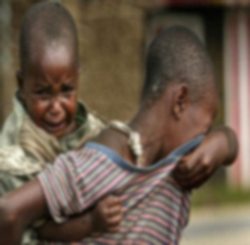
The perverted RPF committed the UNSPEAKABLE.Two orphans, both against the Nazi world. Point is the fact that their parents' murder Kagame & his RPF held no shock in the Western world. Up to now, the Rwandan Hitler Kagame and his death squads still enjoy impunity inside and outside of Rwanda. What goes through someone's mind as they know RPF murdered their parents? A delayed punishment is actually an encouragement to crime, In Praise of the ongoing Bloodshed in Rwanda. “I always think I am a pro-peace person but if someone harmed someone near and dear to me, I don't think I could be so peaceful. I would like to believe that to seek justice could save millions of people living the African Great Lakes Region - I would devote myself to bringing the 'perp' along to a non-happy ending but would that be enough? You'd have to be in the situation I suppose before you could actually know how you would feel or what you would do”. Jean-Christophe Nizeyimana, Libre Penseur
Inzira ndende
Search
Hutu Children & their Mums
Look at them ! How they are scared to death. Many Rwandan Hutu and Tutsi, Foreign human rights advocates, jounalists and and lawyers are now on Death Row Waiting to be murdered by Kagame and his RPF death squads. Be the last to know.
Rwanda-rebranding
Rwanda-rebranding-Targeting dissidents inside and abroad, despite war crimes and repression
Rwanda has “A well primed PR machine”, and that this has been key in “persuading the key members of the international community that it has an exemplary constitution emphasizing democracy, power-sharing, and human rights which it fully respects”. It concluded: “The truth is, however, the opposite. What you see is not what you get: A FAÇADE”
Rwanda has hired several PR firms to work on deflecting criticism, and rebranding the country.
Targeting dissidents abroad
One of the more worrying aspects of Racepoint’s objectives
was to “Educate and correct the ill informed and factually
incorrect information perpetuated by certain groups of expatriates
and NGOs,” including, presumably, the critiques
of the crackdown on dissent among political opponents
overseas.
This should be seen in the context of accusations
that Rwanda has plotted to kill dissidents abroad. A
recent investigation by the Globe and Mail claims, “Rwandan
exiles in both South Africa and Belgium – speaking in clandestine meetings in secure locations because of their fears of attack – gave detailed accounts of being recruited to assassinate critics of President Kagame….
Ways To Get Rid of Kagame
How to proceed for revolution in Rwanda:
- The people should overthrow the Rwandan dictator (often put in place by foreign agencies) and throw him, along with his henchmen and family, out of the country – e.g., the Shah of Iran, Marcos of Philippines.Compaore of Burkina Faso
- Rwandans organize a violent revolution and have the dictator killed – e.g., Ceaucescu in Romania.
- Foreign powers (till then maintaining the dictator) force the dictator to exile without armed intervention – e.g. Mátyás Rákosi of Hungary was exiled by the Soviets to Kirgizia in 1970 to “seek medical attention”.
- Foreign powers march in and remove the dictator (whom they either instated or helped earlier) – e.g. Saddam Hussein of Iraq or Manuel Noriega of Panama.
- The dictator kills himself in an act of desperation – e.g., Hitler in 1945.
- The dictator is assassinated by people near him – e.g., Julius Caesar of Rome in 44 AD was stabbed by 60-70 people (only one wound was fatal though).
- Organise strikes and unrest to paralyze the country and convince even the army not to support the dictaor – e.g., Jorge Ubico y Castañeda was ousted in Guatemala in 1944 and Guatemala became democratic, Recedntly in Burkina Faso with the dictator Blaise Compaoré.
Almighty God :Justice for US
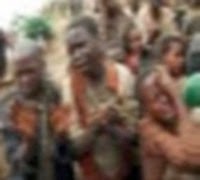
Hutu children's daily bread: Intimidation, Slavery, Sex abuses led by RPF criminals and Kagame, DMI: Every single day, there are more assassinations, imprisonment, brainwashing & disappearances. Do they have any chance to end this awful life?
Killing Hutus on daily basis

RPF targeted killings, very often in public areas. Killing Hutus on daily basis by Kagame's murderers and the RPF infamous death squads known as the "UNKNOWN WRONGDOERS"
RPF Trade Mark: Akandoya
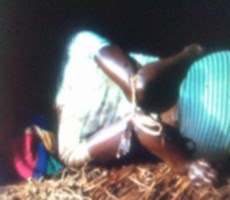
Rape, torture and assassination and unslaving of hutu women. Genderside: Rape has always been used by kagame's RPF as a Weapon of War, the killings of Hutu women with the help of Local Defense Forces, DMI and the RPF military
The Torture in Rwanda flourishes
Fighting For Our Freedom?
We need Freedom, Liberation of our fatherland, Human rights respect, Mutual respect between the Hutu majority and the Tutsi minority
KAGAME VS JUSTICE
Tuesday, November 30, 2010
Sunday, November 21, 2010
Thursday, November 18, 2010
So long as justice and accountability for RPF past and current crimes are ignored and delayed, Peace and Stability will remain illusive and impossible in Rwanda=>ASIF]
OXFORD - For a nation only one tenth of the size of the UK, Rwanda gets a lot of column inches in the world media. Why? Because this is the nation we failed to protect. We must be vigilant so as not to fail again. Sixteen years after the genocide, President Paul Kagame is emerging from the shelter of international guilt to finally face damning criticisms of his government. His tightening grip on power is worrying and the international community must step forward to stop him undoing years of progress.
A UN report released last month put into doubt the notion that Kagame alone stopped Rwanda’s Hutu-led genocide. It accuses Kagame’s forces of vengeful massacres against the Hutu population in Eastern Congo in 1996. The report documented 617 of the worst human rights violations by Rwandan and Ugandan troops against those who had fled the genocide. “Many of the attacks were directed against civilians consisting primarily of women and children”.
Rwanda’s Foreign Minister Louise Mushikiwabo called the report “an attempt to rewrite history”, as Kigali tried to paint this as an attempt to promote the double genocide theory. The government was so desperate to get the report quashed, it even threatened to pull out Rwandan troops from delicate U.N. peacekeeping operations in Sudan. However, the report’s sheer thoroughness makes any criticism hard to sustain. More than 1,200 individual witnesses were interviewed and over 1,500 documents were collected and analysed. This report is no matter of opinion, it’s a matter of fact.
Kagame’s government has enjoyed years as the global aid community’s darling in a troubled region for good reason. Average incomes have more than doubled from $242 in 1999 to $520 in 2010. Kagame as also been a champion for gender equality in the region and Rwanda now boasts the highest share of women in government in the world. Even Transparency International, a Berlin-based anti-corruption monitor, applauds its anti-corruption efforts and rates it as the cleanest country in east Africa. The compliments, however, end here.
Killings and arrests were but a few scandals which emerged in the lead up to August’s Presidential elections. Diplomats were dismayed. Why rig an election when you’re set to win? Firstly, years of struggle in the bush as leader of the RPF means Kagame sees himself as a national hero who would find defeat at the polls too humiliating to consider. Furthermore, weak institutions mean power is concentrated in the executive so all those in positions of power stand to lose if an opponent wins office. This means not only the President but the entire state relies on a Kagame victory, so democracy is undermined by everyone from everywhere.
Defenders of the current regime would argue that his recent slide towards dictatorship is necessary pragmatism. The government faces real constant threats from Hutu extremist groups in the Congo. Grenade attacks in Kigali earlier this year were seen as a sign that rebel forces were ready to attack. The recent arrest of FDLR leader Callixte Mbarushimana by the ICC proves that the groups are facing a crackdown by The Hague so the threat has diminished.
Kagame may also fear attacks from within, as the peace he has brokered among Rwanda’s warring tribes after the tragedy of 1994 remains fragile. His strategy for reconciliation involves eliminating tribal identities and replacing them with a new national identity. The government fears Hutu political opponents, such as Victoire Ingabire, could undermine this with inflammatory comments.
Kagame’s fears are more likely to be realized if he carries on oppressing freedom of speech. Violence may return if he maintains his crackdown on the press. Rebellion is probable unless he allows the prosecution of Tutsis as well as Hutus at the International Criminal Tribunal for Rwanda. The President needs to understand that however noble his aims may be, his methods are misguided.
Britain and America have the power to set things right. Kagame was trained at the US Army College at Fort Leavenworth in Kansas in 1990 and has remained loyal ever since. As Rwanda’s biggest donors, the US and UK provide around $220m of funding each year, which the government budget relies on. Rwanda has also recently joined the commonwealth and switched the country’s entire education system from French to English. Most telling is a recent decision to establish a cricket board. The past 16 years of Kagame’s rule can be seen as an appeasement of Anglo-American desires for the greater benefit of both parties. This year things must change.
Kagame is no longer respecting the ideals he set out to protect in 1994 and in so doing risks all his achievements in reconciling the nation after the genocide. Viable opponents must be found to enable a competitive election to decide Kagame’s successor. Not so many years ago, Mugabe walked down the path to disgrace. We must prevent Kagame from following in his footsteps.
© The Oxford Student
The Truth can be buried and stomped into the ground where none can see, yet eventually it will, like a seed, break through the surface once again far more potent than ever, and Nothing can stop it. Truth can be suppressed for a "time", yet It cannot be destroyed. ==> Wolverine
Tuesday, November 16, 2010
Minister Uri Rosenthal
Buitenlandse Zaken
Mevrouw Ingabire Victoire Umuhoza
Rwandese oppositieleidster
in "1930"
Kigali Gevangenis
in "1930"
Kigali Gevangenis
Gisteren besloot een Rwandese rechter in hoger beroep dat Ingabire, die 16 jaar in Nederland heeft gewoond, blijft vastzitten. Ze werd in oktober opgepakt op verdenking van terroristische activiteiten. Eerder dit jaar wilde ze meedoen aan de presidentsverkiezingen, maar kreeg ze geen toestemming.
Rosenthal is bezorgd over de toestand in Rwanda. Omdat Ingabire Rwandese is, "kan Nederland niet veel voor haar doen".
[Haar man en drie kinderen zijn Nederlanders en blijven in Nederland.=> ASIF]
NOS.nl
'Nederland moet wel opkomen voor Ingabire'
DEN HAAG (ANP) - Nederland moet wel degelijk Rwanda aanspreken op de arrestatie van oppositieleidster Victoire Ingabire, die zestien jaar in Nederland woonde. Dat zei haar advocaat Jan Hofdijk dinsdag.
Ingabire zit sinds 16 oktober in de cel, na een aanklacht dat zij de regering omver zou willen werpen. De Nederlandse ambassade in Rwanda kan officieel niks doen voor de gearresteerde presidentskandidate, zei ambassadeur Frans Makken maandag.
'Nederland helpt Rwanda met het opbouwen van een rechtssysteem en gevangenissen. Dan moeten wij toch zeker Rwanda kunnen aanspreken over deze politieke gevangene', zegt Hofdijk. Volgens hem is de aanklacht compleet verzonnen.
Nederland is de grootste buitenlandse investeerder in Rwanda. Bedrijven als Heineken, Draka en Rabobank zijn er actief. Luchtvaartmaatschappij KLM vliegt sinds zondag vijf keer in de week naar Rwanda.
Voorbeeldfunctie
Advocaat Hofdijk meent dat Nederland daarom een voorbeeldfunctie heeft in Rwanda. 'Veel andere diplomaten kijken er naar de opstelling van Nederland. Maar Nederland speelt er een perfide rol. Het zegt zelfs dat het land veilig genoeg is om mensen naar terug te sturen, wat veel andere regeringen in Europa ontkennen.'
Oppositie
De etnische Hutu Ingabire (43) was in januari teruggekeerd naar Rwanda om mee te doen aan de presidentsverkiezingen van augustus. Daar kreeg ze echter geen toestemming voor. De zittende Tutsi-president Paul Kagame won zonder noemenswaardige oppositie met 93 procent van de stemmen.
© rnw.nl
Related articleVolgens Hofdijk vreest Victoire Ingabire dat ze vergiftigd wordt in de gevangenis, wat in Rwanda vrij gebruikelijk zou zijn. Hofdijk is vooral uit op een eerlijke rechtsgang. Het gaat hem niet zozeer om terugkeer van Victoire Ingabire naar haar gezin in Zevenhuizen. Zijzelf wil vooral actief blijven in Rwanda.
Genocynisme
The Truth can be buried and stomped into the ground where none can see, yet eventually it will, like a seed, break through the surface once again far more potent than ever, and Nothing can stop it. Truth can be suppressed for a "time", yet It cannot be destroyed. ==> Wolverine
Subscribe to:
Posts
(Atom)
AS International
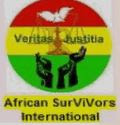
SurViVors SPEAK OUT - Rights of Victims Seeking Justice and Compensation for the RPF Genocide. This is an Exciting Collaborative Project launched by The AS International Founder Jean-Christophe Nizeyimana, Economist and Human Rights Activist. Join US and Be the First to know about the Mastermind of the Rwandan Genocide Still At large and enjoing Impunity.
Profile
I am Jean-Christophe Nizeyimana, an Economist, Content Manager, and EDI Expert, driven by a passion for human rights activism. With a deep commitment to advancing human rights in Africa, particularly in the Great Lakes region, I established this blog following firsthand experiences with human rights violations in Rwanda and in the DRC (formerly Zaïre) as well. My journey began with collaborations with Amnesty International in Utrecht, the Netherlands, and with human rights organizations including Human Rights Watch and a conference in Helsinki, Finland, where I was a panelist with other activists from various countries.
My mission is to uncover the untold truth about the ongoing genocide in Rwanda and the DRC. As a dedicated voice for the voiceless, I strive to raise awareness about the tragic consequences of these events and work tirelessly to bring an end to the Rwandan Patriotic Front (RPF)'s impunity.
This blog is a platform for Truth and Justice, not a space for hate. I am vigilant against hate speech or ignorant comments, moderating all discussions to ensure a respectful and informed dialogue at African Survivors International Blog.
Genocide masterminded by RPF
Finally the well-known Truth Comes Out.
After suffering THE LONG years, telling the world that Kagame and his RPF criminal organization masterminded the Rwandan genocide that they later recalled Genocide against Tutsis. Our lives were nothing but suffering these last 32 years beginning from October 1st, 1990 onwards. We are calling the United States of America, United Kingdom, Japan, and Great Britain in particular, France, Belgium, Netherlands and Germany to return to hidden classified archives and support Honorable Tito Rutaremara's recent statement about What really happened in Rwanda before, during and after 1994 across the country and how methodically the Rwandan Genocide has been masterminded by Paul Kagame, the Rwandan Hitler. Above all, Mr. Tito Rutaremara, one of the RPF leaders has given details about RPF infiltration methods in Habyarimana's all instances, how assassinations, disappearances, mass-slaughters across Rwanda have been carried out from the local autority to the government,fabricated lies that have been used by Gacaca courts as weapon, the ICTR in which RPF had infiltrators like Joseph Ngarambe, an International court biased judgments & condemnations targeting Hutu ethnic members in contraversal strategy compared to the ICTR establishment to pursue in justice those accountable for crimes between 1993 to 2003 and Mapping Report ignored and classified to protect the Rwandan Nazis under the RPF embrella . NOTHING LASTS FOREVER.
Human and Civil Rights
Human Rights, Mutual Respect and Dignity
For all Rwandans :
Hutus - Tutsis - Twas
Rwanda: A mapping of crimes
Rwanda: A mapping of crimes in the book "In Praise of Blood, the crimes of the RPF by Judi Rever
Be the last to know: This video talks about unspeakable Kagame's crimes committed against Hutu, before, during and after the genocide against Tutsi in Rwanda.
The mastermind of both genocide is still at large: Paul Kagame
KIBEHO: Rwandan Auschwitz
Kibeho Concetration Camp.
Mass murderers C. Sankara
Stephen Sackur’s Hard Talk.
Prof. Allan C. Stam
The Unstoppable Truth
Prof. Christian Davenport
The Unstoppable Truth
Prof. Christian Davenport Michigan University & Faculty Associate at the Center for Political Studies
The killing Fields - Part 1
The Unstoppable Truth
The killing Fields - Part II
The Unstoppable Truth
Daily bread for Rwandans
The Unstoppable Truth
The killing Fields - Part III
The Unstoppable Truth
Time has come: Regime change
Drame rwandais- justice impartiale
Carla Del Ponte, Ancien Procureur au TPIR:"Le drame rwandais mérite une justice impartiale" - et réponse de Gerald Gahima
Sheltering 2,5 million refugees
Credible reports camps sheltering 2,500 million refugees in eastern Democratic Republic of Congo have been destroyed.
The UN refugee agency says it has credible reports camps sheltering 2,5 milion refugees in eastern Democratic Republic of Congo have been destroyed.
Latest videos
Peter Erlinder comments on the BBC documentary "Rwanda's Untold Story
Madam Victoire Ingabire,THE RWANDAN AUNG SAN SUU KYI
Rwanda's Untold Story
Rwanda, un génocide en questions
Bernard Lugan présente "Rwanda, un génocide en... par BernardLugan Bernard Lugan présente "Rwanda, un génocide en questions"
Nombre de Visiteurs
Pages
Popular Posts - Last 7 days
-
[Since 1994, the world witnesses the horrifying Tutsi minority (14%) ethnic domination, the Tutsi minority ethnic rule with an iron hand,...
-
Les survivants du génocide rwandais INSISTENT sur l'embargo contre le régime nazi du FPR Le Control Arms, qui a révélé ces Affaires, ...
-
Professor and Constitutional Criminal Lawyer Peter Erlinder is interviewed by host Karen Redleaf. Watch this video to understand: http://ou...
-
ANALYSIS OF PRESIDENT MUSEVENI’S ROLE IN THE BLOODY RWANDA WAR OF 1990. FINALLY UGANDA’S MUSEVENI OFFICIALLY ACCEPTS HIS ROLE IN THE MASS K...
-
ANN GARRISON DECEMBER 26,2014 [Since 1994, the world witnesses the horrifying Tutsi minority (14%) ethnic domination, the Tutsi mi...
-
Another war we don't see in the Rwanda and Congolese genocides. The Rwandan genocide was and still remains the very easy tragic even...
-
This is not an ASI publication. ASI is not responsible for, nor does it endorse, its content. Any views expressed are solely those of the...
-
Une victoire de la liberté d'expression France : 18 Novembre - P ierre P éan était poursuivi pour diffamation raciale et provoca...
-
[Since 1994, the world witnesses the horrifying Tutsi minority (14%) ethnic domination, the Tutsi minority ethnic rule with an i...
-
[Since 1994, the world witnesses the horrifying Tutsi minority (14%) ethnic domination, the Tutsi minority ethnic rule with an iron hand,...
Archives
-
▼
2010
(289)
-
▼
November
(10)
- US embassy cables: Washington requests biometric i...
- Victoire Ingabire Umuhoza's Petitition Signed by A...
- The Honneymoon Is Over
- The ICG fuel the flames of violence in the African...
- Zorg om Rwandese oppositieleidster
- KPFA News: Ingabire, Gasana, Kambanda, and Rwanda,...
- DR Congo: Q & A on the United Nations Human Rights...
- Another Kagame aide reveals boss’ secret killing s...
- Cutting Dutch aid clear signal to Rwanda
- Let the Remembrance of the Rwandan and Congolese H...
-
▼
November
(10)
Everything happens for a reason
Bad things are going to happen in your life, people will hurt you, disrespect you, play with your feelings.. But you shouldn't use that as an excuse to fail to go on and to hurt the whole world. You will end up hurting yourself and wasting your precious time. Don't always think of revenging, just let things go and move on with your life. Remember everything happens for a reason and when one door closes, the other opens for you with new blessings and love.
Hutus didn't plan Tutsi Genocide
Kagame, the mastermind of Rwandan Genocide (Hutu & tutsi)

















